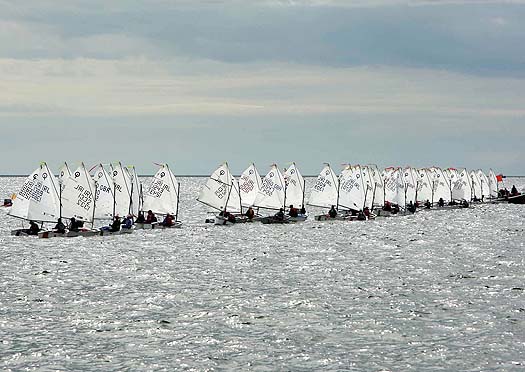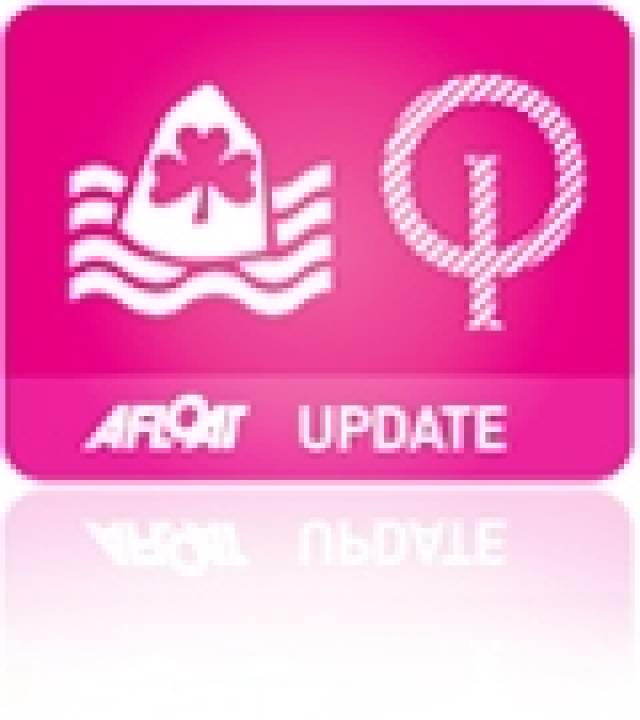#OPTIMIST – What is an Optimist dinghy?
The Optimist is, quite simply, the dinghy in which the young people of the world learn to sail writes Joan O'Sullivan of the Irish Optimist class
Specifications - 2.31m (7'6.1/2") long, 1.13m (3'8") wide. Weight 35kg (77lbs).
Easily transported on top of any car, safe and simple enough for an 8-year old, exciting and technical enough for a 15-year old.
Sailed in over 110 countries by over 150,000 young people, it is the only dinghy approved by the International Sailing Federation exclusively for sailors under 16 years of age.
Over half of the dinghy skippers at the last Olympic Games were former Optimist sailors.
The boat was designed by Clarke Mills in Florida in 1947; they first came to Europe in 1954 when a fleet started in Denmark.
Most parents find that sailing gives young people a great sense of personal achievement. In addition the skills required to improve sailing performance both on and off the water; it helps young people develop a more organised approach to other non-sailing related activities.

A busy Optimist start line at Dunmore East. Photo: Noel Browne
How many Optimists are there in Ireland?
More than 1,450 Optimists have been registered in Ireland to date.
At Optimist events in Ireland this year the fleet size varied between 120 at Regional events and 200 at our National Championships. International events can be much larger and at an Easter Regatta on Lake Garda in 2011 there was just short of 1000 boats.
How can I join a sailing club that sails Optimists?
There is a network of over 70 sailing clubs in Ireland and a network of commercial sailing schools too. The junior or dinghy sailing coordinator in each club should be able to tell you if they have an active Optimist class in that club. Your interest could be the spark that ignites an Optimist interest there and IODAI will endeavour to support clubs who wish to start an Optimist fleet.
Alternatively, contact the International Optimist Dinghy Association in Ireland(IODAI). This is a voluntary association, primarily comprised of parents of Optimist sailors, who organise events for the Optimist class. Iodai have a very informative, active website at www.iodai.com. If you contact the IODAI secretary directly, [email protected] you will be put in touch with an IODAI regional representative who will guide you towards a suitably active Optimist club.
What age should a child start sailing Optimists?
Some clubs do not provide beginner training under 9 or 10 years of age. However this is changing and you should check with your local club. See if any other experienced parent can suggest how a younger sailor might start.
There are plenty who start earlier and eleven or twelve is not too late - even to get to the top in the fleet.
Some considerations before beginning:
· Is your child a competent swimmer? (Competent means comfortable in the water when out of depth and capable of swimming say 25 meters in the sea water while dressed in normal clothing).
· Comfortable about the prospect of trying sailing? (The prospect of being alone in charge of a boat is often daunting to a young child and this introduction to the water is the most important step).
· Are there any older brothers, sisters or friends involved in sailing? This is often a great help.
· Is the child and are the parents prepared to make the commitment? There is a lot of time involved in junior sailing. Parents, remember, they can't drive themselves to training or events and they need lots of help ashore especially in the early days.
IODAI contact every sailing club from time to time to determine their level of interest in the Optimist class and to maintain an open invitation for any sailing club to seek assistance in the forming of an Optimist class at that club.
My child has done some sailing courses at our local club, what next?
There is a vibrant racing circuit in Ireland for the Optimist class.
Most clubs have a racing season which runs from late spring until the end of the summer, and they also hold their own annual dinghy regattas which normally include Optimist racing and are an excellent way to begin racing.
Once a child has done a little racing, they can look outside their own club. IODAI hold a full series of events specifically for Optimists; 4 regional 2-day events, the Optimist Nationals in August, Spring training week in Baltimore, and an Autumn training week. These events are open to children at all levels.
The Spring training week (13-17 February 2012) - 5 days training with a variety of coaches, national and international, and a mixed ability group of 150 sailors - is an ideal way to begin sailing outside the sailor's own club and for a child to meet other sailors of their own level.
Local club Junior Co-ordinators will have information about all Optimist events. The IODAI website is also a wealth of information for those starting out.
The Optimist dinghy is a simple and safe; designed specifically for young sailors. So, no matter what other boat a child has used on their courses, they should be able to handle an Optimist.
Are Optimists suitable for girls?
The Optimist provides superb one design racing where boys and girls can compete on equal terms. Yearly rankings often produce a 50:50 split between boys and girls. In 2005, 2006 and 2007 the Irish National Championship was won by Diana Kissane, from Howth Yacht Club who set a record by winning the title in three successive years.
In 2011, the Trials series (selection process for the year's international teams) was won by Sophie Browne from Tralee; the National Championships 2011 were won by Sean Donnelly from Dun Laoghaire, so boys and girls continue to compete equally.
How do they start racing?
As a Junior Class we have knowledge of helping sailors make the transition from "messing about in boats" to actual racing. This is where our innovative Regatta Fleet comes in.
Regatta Fleet Racing is for beginners and unranked sailors - usually from age 8 upwards. The focus of the Regatta Fleet is on having fun. There is a Regatta Fleet element at most major Optimist events except the Trials series.
The Regatta Fleet will could be your sailors first experience of racing. They can enter the Regatta Fleet once they have learnt to sail to windward and can negotiate a simple triangular course.
A typical Regatta Fleet day is usually shorter that the main fleet. Normally the format is coaching in the morning, a break ashore for lunch and then some simple races in the afternoons; the aim is to make the introduction as easy as possible. It's not taken too seriously and coaches are allowed to give advice during racing. If a sailor is towards the front, advice may not be necessary and the coaches will tend to concentrate on those near the back. While the Regatta Fleet focus is on training not prizes, some prizes are awarded, and it often proves to be the most charming part of the prize giving ceremony where we see very young children collect their first sailing trophy.
Regatta Fleet Racing at events gives the younger sailor the experience of doing circuit events without the pressures of racing way out to sea over long courses. There are often around 50 boats racing and it's their first introduction to the wonderful circle of friends that sailing produces for all of us.
Do we need to buy a boat?
Many sailing clubs have a small number of Optimists for rent on a short-term basis, but for anything other than very short term, it is best that your child owns a boat.
There is always an ample supply of second hand boats around. Check your local club notice board or if your club doesn't have an Optimist fleet, check with other clubs.
The most prolific market is on the IODAI website where there is a continuous flow of boats for sale on the 'Buy and Sell' page.
In relation to the New vs. Second-hand debate, experience shows that before boat-handling skills are acquired, the new sailor is likely to have a number of mishaps. For this reason, it is probably best to learn in an older boat that will not complain when it gets knocked about.
'Woodeners'? Generally there are no longer wooden Optimists on the Optimist Circuit although they sometimes offer an excellent bargain to get your child started.
The best advice is to ask a parent who has a reasonably current technical knowledge of optimists to 'survey' the prospective second-hand boat for you.
My club doesn't have an Optimist fleet, can we still get involved?
Yes, of course. There are many Optimist sailors who belong to clubs with no real Optimist fleet. It does involve a bit of travelling but there is always ample opportunity for training at Regional venues. The travelling isn't that bad and once you and your sailor meet new friends it will cease to be a problem.
While the Optimist calendar is a full one and parents/sailors may find the implication of a serious Optimist programme just a little bit daunting - the truth is that most young children (and parents!) find the experience lots of fun.































































